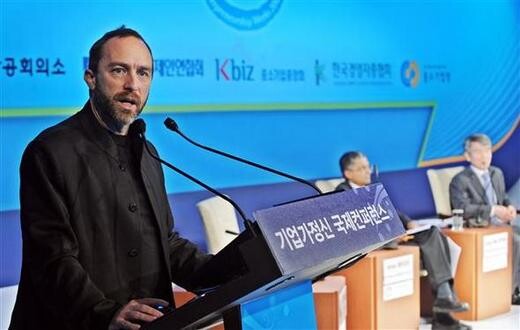hankyoreh
Links to other country sites 다른 나라 사이트 링크
[Interview] Wikipedia founder critical of real-name Internet system

Wikipedia founder Jimmy Wales, 43, has indicated the dangers of government Internet controls in South Korea. In a speech delivered at an international conference on the entrepreneurial spirit held Monday at Seoul’s Walkerhill Hotel under the auspices of the Ministry of Knowledge Economy, Wales criticized the government’s policy, saying, “A ‘real-name Internet system’ is not in accordance with a free democracy. I hope that the Korean government seriously considers that.” In 2001, Wales founded the online encyclopedia Wikipedia (wikipedia.org), and is chairman emeritus of the Wikimedia Foundation, the non-profit organization that operates the encyclopedia. He was also chosen as one of the 100 most influential people in the world by the news weekly Time. He sat down for a separate interview with The Hankyoreh following his lecture Monday.
Hankyoreh: The Grand National Party has presented a bill to criminalize Internet insults.Wales: I don’t see a problem with punishing someone for criminal contempt when they cause damage to another person’s honor. But the problem is forcing people to use real names online. There is a lot of desire to express opinions anonymously, and various roundabout ways can arise. And there really isn’t any effect either.
Q: Google Korea’s YouTube is facing a crossroads with its service methods, as it is soon to become the target of implementation of the real-name system.A: It’s a very bad idea. The Korean Internet industry will suffer difficulties because of the real-name system. Even if it pulls out of Korea, Google can still offer services and sell ads in other places besides Korea. In terms of effectiveness as well, the Korean government will have difficulties if it doesn’t install a Chinese-style firewall.
Q: Some people claim that the desire to create will only survive if copyrights are protected.A: In areas like music, copyrights are necessary for the development of content. But on the Internet, the need for copyright protection is less than what some people claim. They claim that you need copyrights to turn a profit, but the example of Wikipedia has shown that isn’t the case. They say that illegal copying will set the music industry back, but music culture itself has not been hurt. It’s just been partial damage to the music industry itself.
Q: Can Internet dysfunction be resolved through openness?A: Both online and offline, there needs to be a foundation for taking responsibility. What’s needed isn’t more regulation. People need to concern themselves with forming a healthy online community. A top-down method of government regulation isn’t effective with the Internet.
Editor’s Note: This interview was conducted in English and Korean, and the article was written in Korean. Mr. Wales’s comments have therefore been translated from English to Korean and back into English.Please direct questions or comments to [englishhani@hani.co.kr]
Editorial・opinion
![[Column] Season 2 of special prosecutor probe may be coming to Korea soon [Column] Season 2 of special prosecutor probe may be coming to Korea soon](https://flexible.img.hani.co.kr/flexible/normal/500/300/imgdb/original/2024/0426/3317141030699447.jpg) [Column] Season 2 of special prosecutor probe may be coming to Korea soon
[Column] Season 2 of special prosecutor probe may be coming to Korea soon![[Column] Park Geun-hye déjà vu in Yoon Suk-yeol [Column] Park Geun-hye déjà vu in Yoon Suk-yeol](https://flexible.img.hani.co.kr/flexible/normal/500/300/imgdb/original/2024/0424/651713945113788.jpg) [Column] Park Geun-hye déjà vu in Yoon Suk-yeol
[Column] Park Geun-hye déjà vu in Yoon Suk-yeol- [Editorial] New weight of N. Korea’s nuclear threats makes dialogue all the more urgent
- [Guest essay] The real reason Korea’s new right wants to dub Rhee a founding father
- [Column] ‘Choson’: Is it time we start referring to N. Korea in its own terms?
- [Editorial] Japan’s rewriting of history with Korea has gone too far
- [Column] The president’s questionable capacity for dialogue
- [Column] Are chaebol firms just pizza pies for families to divvy up as they please?
- [Column] Has Korea, too, crossed the Rubicon on China?
- [Correspondent’s column] In Japan’s alliance with US, echoes of its past alliances with UK
Most viewed articles
- 1‘We must say no’: Seoul defense chief on Korean, USFK involvement in hypothetical Taiwan crisis
- 2Is Japan about to snatch control of Line messenger from Korea’s Naver?
- 3No good, very bad game for Korea puts it out of Olympics for first time since 1988
- 4Samsung subcontractor worker commits suicide from work stress
- 5[Editorial] Korea’s surprise Q1 growth requires objective assessment, not blind fanfare
- 6Division commander ordered troops to enter raging flood waters before Marine died, survivor says
- 7N. Korean delegation’s trip to Iran shows how Pyongyang is leveraging ties with Moscow
- 8Korea’s 1.3% growth in Q1 signals ‘textbook’ return to growth, says government
- 9Flying “new right” flag, Korea’s Yoon Suk-yeol charges toward ideological rule
- 10[Column] Park Geun-hye déjà vu in Yoon Suk-yeol